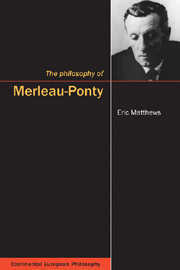3 - Being-in-the-world
Summary
Phenomenological philosophy, as Merleau-Ponty conceives it, “consists in re-learning to look at the world”. We need to re-learn to look at the world because we are “held captive” (to use Wittgenstein's phrase) by a picture of the world derived from the impulses that give rise to science – an objectivist picture of the world (including even our own bodies) as existing entirely independent of ourselves and interacting with our experience in a merely causal fashion. There is nothing wrong with this picture in its own context; if we are to study the world scientifically, then we need to set aside our own place in the world, to view the world not from where we happen to be, but as if we were completely outside it. Recent Anglo-American philosophers have referred to this purely detached scientific viewpoint by talking of “the view from nowhere” (Thomas Nagel) or “the absolute conception” (Bernard Williams); others have spoken of adopting the “God's-eye view”. Merleau-Ponty is not in any sense opposed to science, as we have seen. What he is opposed to is the idea that this scientific picture represents a complete and self-sufficient view of reality. It cannot be self-sufficient, he argues, because it depends for its own significance on a prior view of reality; its concepts derive their meaning from our ordinary pre-reflective experience of the world as participants in it. The “view from nowhere” is an abstraction based on our many different “views from somewhere”.
- Type
- Chapter
- Information
- The Philosophy of Merleau-Ponty , pp. 45 - 66Publisher: Acumen PublishingPrint publication year: 2002

